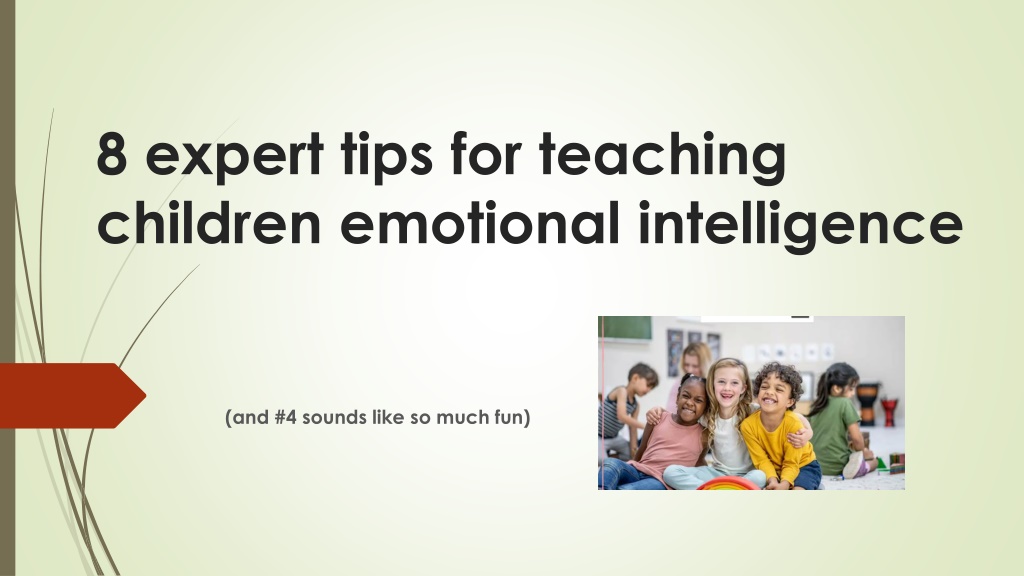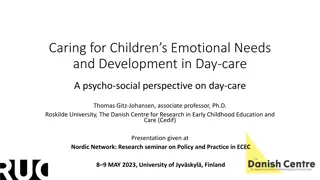Expert Tips for Teaching Children Emotional Intelligence
Teaching emotional intelligence to children is crucial for their mental health and social skills development. By helping them understand and manage their emotions, parents can equip their children with the tools to navigate life's challenges and build positive relationships. Parenting coach Anisa Lewis emphasizes the importance of labeling emotions, reading books about feelings, and fostering an understanding of emotions to enhance children's emotional intelligence.
Download Presentation

Please find below an Image/Link to download the presentation.
The content on the website is provided AS IS for your information and personal use only. It may not be sold, licensed, or shared on other websites without obtaining consent from the author.If you encounter any issues during the download, it is possible that the publisher has removed the file from their server.
You are allowed to download the files provided on this website for personal or commercial use, subject to the condition that they are used lawfully. All files are the property of their respective owners.
The content on the website is provided AS IS for your information and personal use only. It may not be sold, licensed, or shared on other websites without obtaining consent from the author.
E N D
Presentation Transcript
8 expert tips for teaching children emotional intelligence (and #4 sounds like so much fun)
Emotional intelligence is the ability to understand and regulate our feelings - and it's a skill a child can start to learn at any age. PUBLISHED 8 FEBRUARY 2024 Emotionally intelligent people tend to have self-awareness, empathy and excellent communication skills. If you want to help your child develop these traits, you'll need to know how to teach them emotional intelligence. Starting a conversation about mental health with children isn't always easy - some children are too young to understand it, while older children might feel reluctant to open up. Nevertheless, children's mental health weighs on many parents' minds - especially in today's society, where social media and screen time have become an increasing concern, and many families are still feeling the lingering effects of the pandemic.
Along with using toys to support your child's mental health, there are other ways parents can equip children to be more resilient and learn how to better manage and express their emotions. And teaching emotional intelligence is key. Emotional intelligence refers to a person's ability to express and manage their emotions appropriately, but - given that emotions are a pretty abstract concept - it's not an easy skill for children to develop and they need adults to help them learn.
Parenting coach Anisa Lewis explains, "Teaching children emotional intelligence is ultimately helping children to foster an understanding of emotions. By doing this, they can learn to navigate their feelings and those of others, leading to improved mental health and enhanced social skills. Emotional intelligence can also aid in equipping our children with the tools to handle conflicts and communicate effectively, whilst building positive relationships. Emotional intelligence is linked with resilience and this helps our children to have the capacity to navigate life's challenges."
How to teach children emotional intelligence 1. Label the emotions Labelling the emotions that your child experiences can give them the vocabulary to talk about how they feel in the future, but it also shows them that you understand what they are going through. Anisa explains, "Encouraging children to identify and label their emotions helps them understand the wide range of feelings they may experience. This can be done in the moment, through identification from the parents/carers. For example, saying, I can see you are angry or That must be frustrating for you. " Anisa adds that you can also add labels to emotions by reading books and stories about feelings with your child.
2. Validate your child's feelings Pricilla tells us that asking your children questions about how they feel and showing curiosity towards what they are experiencing is a key way to teach emotional intelligence. She explains, "When children come to trust and rely on the fact that all their emotions are important and that their parents will always ask about and focus on them, then they will learn to believe in and trust their own feelings - and that builds emotional intelligence." Priscilla suggests asking questions like 'How did you feel when that happened?' 'I m trying to imagine if that was uncomfortable for you?' or 'On a scale of 1-10, how comfortable did you feel?' in order to validate your child's feelings.
3. Model active listening Active listening goes beyond simply hearing the words the person talking is saying, and concentrating on the message they are trying to get across - including any non-verbal cues. It's an essential communication skill because it helps to better understand another person's point of view. Anisa explains that by practicing active listening when your child is talking, you can teach it to your kids. "Show children how to pay attention to verbal and non-verbal cues when others are expressing their emotions. This skill fosters empathy and helps kids understand different perspectives and feelings," she explains, adding, "It also helps foster the understanding that not all communication is verbal."
4. Use movement A study published in the journal Learning, Culture and Social Interaction explored how movement helped learning around abstract concepts of emotion when studying two Year 1 classes (children aged 5-6). Using guided and improvisational dance, a movement was used as a mean- making tool to prompt embodied experience and talk. The researchers called the process Developing Understandings of Emotions through Movement (DUEM) and noted that it has the double benefit not only of the movement itself but also of making meanings for complex concepts - such as emotion - through the embodiment and exploration of physical metaphors. You could try encouraging your kid to express the way they're feeling by using their entire body, helping them to become aware of the emotion they are experiencing by paying attention to the way their body moves and feels.
5. Don't look to solutions Priscilla explains, "When children have their feelings solved immediately, or are met with expressions like 'oh it's not that bad' or 'you will feel better tomorrow', they don t learn to be with or feel their feelings." She adds, "Children need to know that there are times in life when they will feel sad, furious, devastated or that life is terribly unfair and a parent s job is to help their children learn to feel those feelings rather than to try and negate or get rid of them straight away." Priscilla explains that children who can bear their feelings are more emotionally intelligent - let them sit in their feelings by listening to them and asking them questions, rather than trying to make things better straight away.
6. Teach empathy Teaching children to not take things at face value and instead wonder how the feelings of another person might be making them behave is key to fostering emotional intelligence. Priscilla explains, "When children can understand that people s behaviour is often influenced by and driven by their feelings, they can start to relate to people in an emotionally intelligent way." Encourage your kids to think about how another person might have different feelings towards a situation than they do themselves. You could discuss what a film character might be feeling in a certain scene to help teach this skill.
7. Practice mindfulness "Simple practices, such as deep breathing or guided imagery can provide tools for emotional regulation," explains parenting coach Anisa. Engaging a child s senses in the moment is a quick way to bring mindfulness into their experiences and these techniques contribute to a child's overall emotional resilience. Check out these mindfulness activities for kids for inspiration.
8. Show your own emotions Children need to see emotions being shown and talked about, Priscilla tells us, so it's important that you can show yours to them and explain your feelings. "Let them know why you suddenly feel angry when the house is in a muddle of toys, or explain why your work meeting was uncomfortable for you," Priscilla says. "They need to see the most important people in their lives have big feelings and can talk about them."























